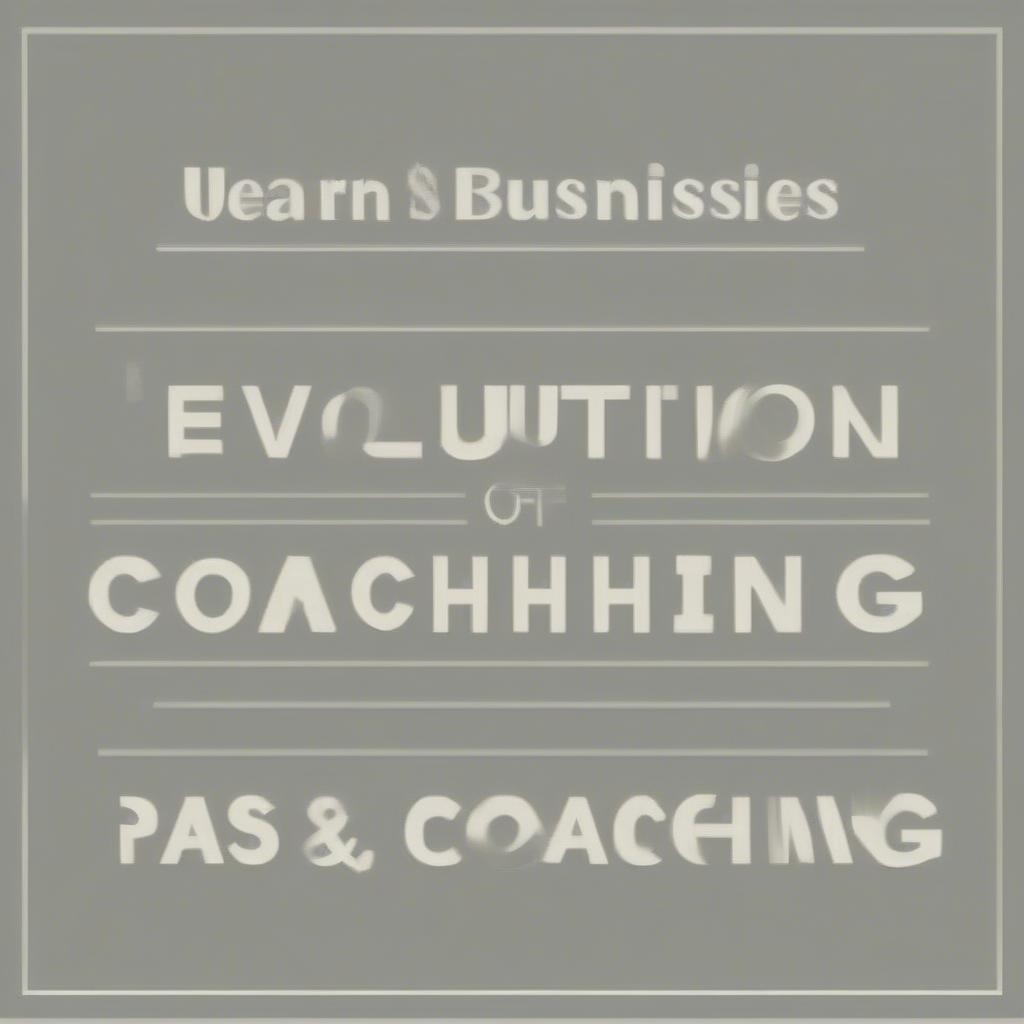
The Power of Social Media for Coaching Businesses
In today’s digital age, a strong online presence is no longer optional for coaches; it’s essential. Social media platforms are powerful tools that, when used strategically, can significantly expand your reach, attract new clients, and build a thriving coaching practice. Let’s dive into why social media marketing is so crucial for coaches and how to leverage it effectively.
Why is Social Media Marketing Vital for Coaches?
- Reach a Wider Audience: Unlike traditional marketing, social media allows you to connect with potential clients from around the globe. This eliminates geographical limitations and opens up a world of possibilities for your coaching business. This means more people discover your coaching expertise.
- Build Brand Awareness: Consistent engagement on social media helps establish your brand and solidify your reputation as a trusted and knowledgeable coach. A strong brand builds trust and is crucial to attracting the right clients.
- Generate Leads and Clients: Social media platforms are prime locations for lead generation. By showcasing your expertise, providing valuable content, and engaging with your audience, you can attract qualified leads that can convert into paying clients.
- Build Community and Engagement: Social media is all about connection. It allows you to build a community around your brand, fostering meaningful interactions and creating loyal followers who are eager to learn from you.
- Cost-Effective Marketing: Compared to traditional advertising methods, social media marketing is remarkably cost-effective, especially for new coaching businesses. You can achieve significant results without breaking the bank.
- Showcase Expertise: Platforms like LinkedIn, YouTube, and even Instagram provide avenues for sharing valuable insights, case studies, and client testimonials, establishing you as an expert in your coaching niche.
Setting the Foundation: Defining Your Social Media Strategy
Before you jump headfirst into posting on every platform, it’s crucial to develop a solid social media strategy. This foundational step ensures that your efforts are targeted and effective.
1. Define Your Target Audience
- Who are you trying to reach? Identify your ideal client—their demographics, needs, challenges, and aspirations.
- What are their pain points? Understanding their struggles allows you to create content that resonates and provides genuine solutions.
- Where do they spend their time online? Knowing which social media platforms your ideal clients frequent helps you focus your efforts effectively.
2. Set Clear Goals
- What do you hope to achieve through social media? Are you aiming for brand awareness, lead generation, increased engagement, or all of the above?
- Set specific, measurable, achievable, relevant, and time-bound (SMART) goals. For instance, "Increase website traffic by 20% in the next quarter" is a SMART goal.
3. Select the Right Platforms
- Not all platforms are created equal. Choose platforms that align with your target audience and your coaching niche.
- For professional development coaches: LinkedIn is a must.
- For health and wellness coaches: Instagram and Pinterest are ideal.
- For life coaches: Facebook and YouTube can be effective.
4. Develop a Content Calendar
- Plan your content in advance. Use a content calendar to schedule posts, ensuring consistent activity and a varied content mix.
- Mix different types of content: Blog posts, videos, images, infographics, and live sessions will keep your audience engaged.
Platform-Specific Strategies: Maximizing Your Impact
Each social media platform has its own nuances. Let’s explore how to make the most of the major players.
LinkedIn: The Professional Playground for Coaches
LinkedIn is a powerhouse for coaches, especially those working in the professional development space.
Optimizing Your Profile for Maximum Impact
- Professional Headshot: Use a high-quality, professional headshot.
- Compelling Headline: Go beyond your job title; use a headline that highlights your expertise and the benefits you offer.
- Detailed "About" Section: Tell your story, share your passion, and showcase your unique value proposition.
- Keywords: Sprinkle relevant keywords throughout your profile to enhance searchability.
- Showcase Your Expertise: Utilize LinkedIn’s "Featured" section to share articles, testimonials, and valuable resources.
- Network Strategically: Connect with your target audience and engage with their content.
LinkedIn Content Strategies for Coaches
- Share valuable industry insights: Publish articles, share relevant industry news, and offer your expert commentary.
- Post thought-provoking questions: Encourage engagement and spark conversations.
- Share client testimonials and success stories: Build credibility and social proof.
- Participate in relevant groups: Engage with your target audience and establish yourself as an expert.
- Go live with LinkedIn Live: Host Q&A sessions, deliver mini-workshops, and share your expertise in real time.
Instagram: Visual Storytelling for Coaches
Instagram is a visual platform perfect for coaches who want to build a personal brand and connect with their audience on a deeper level.
Crafting an Engaging Instagram Profile
- Consistent Aesthetics: Use a consistent color palette and style for your photos and graphics to create a visually appealing feed.
- Compelling Bio: Clearly explain what you offer and include a call-to-action (e.g., link to your website).
- Use Highlights strategically: Organize your stories into relevant categories for easy access to your audience.
- Post a Variety of Content : use carousels, reels, videos, live stream.
- Engage With Others : Respond to messages, comment on other people’s posts, join in conversations.
Instagram Content Strategies for Coaches
- Share inspirational quotes and graphics: Offer motivation and visual appeal.
- Behind-the-scenes glimpses: Show the human side of your business and build rapport.
- Share tips and mini-coaching sessions: Provide value and showcase your expertise.
- Use Instagram Stories to connect with your audience daily: Share quick updates, polls, and quizzes to encourage engagement.
- Utilize Reels to create short engaging videos: Create valuable and easily digestible video content for your audience.
- Go live with Instagram Live: Host Q&A sessions, deliver mini-workshops, and share your expertise in real time.
Facebook: Building Community and Engagement
Facebook is an excellent platform for building a community and connecting with potential clients through groups and engaging posts.
Setting Up a Professional Facebook Page
- Complete Your Business Page: Ensure all details are accurate and up to date.
- Compelling Cover Photo: Use a high-quality cover photo that reflects your brand.
- Clear Call-to-Action Button: Make it easy for people to contact you or visit your website.
- Create a Community Through Facebook Groups: Host your own free or paid Facebook group that provides value to your potential clients.
- Use Messenger Wisely: Respond promptly to messages from potential clients.
Facebook Content Strategies for Coaches
- Share blog posts and articles: Provide valuable insights and resources.
- Run contests and giveaways: Generate excitement and increase engagement.
- Ask questions and encourage discussions: Foster a sense of community.
- Host Facebook Live sessions: Engage with your audience in real time and deliver valuable content.
- Share client success stories: Build credibility and social proof.
YouTube: The Power of Video Marketing
YouTube is a powerful platform for sharing in-depth content and showcasing your expertise through video.
Creating a Compelling YouTube Channel
- Professional Channel Art: Design channel art that reflects your brand and personality.
- Clear Channel Description: Explain what your channel is about and the value you offer.
- Organize Your Videos into Playlists: Make it easy for viewers to find the content they are looking for.
- Use Thumbnails Wisely: Create eye-catching thumbnails that encourage viewers to click.
- Promote Your Videos : Share your videos across all of your platforms.
YouTube Content Strategies for Coaches
- Create How-To Tutorials: Share actionable advice and insights.
- Host interviews with experts: Provide value through collaboration and knowledge sharing.
- Record coaching sessions: Showcase your coaching style and demonstrate your skills.
- Share client testimonials: Build credibility and social proof.
- Run Q&A sessions: Address common questions and provide valuable insights.
Content Creation Strategies: Captivating Your Audience
Great content is the heart of any successful social media strategy.
Understanding Your Audience’s Needs
- Address Pain Points: Create content that directly addresses your audience’s challenges and offers practical solutions.
- Provide Value: Focus on delivering valuable information and insights that help your audience achieve their goals.
- Stay Authentic: Be genuine and let your personality shine through. People connect with authenticity and passion.
- Ask Questions: Encourage engagement by asking your audience questions and inviting them to share their thoughts.
- Utilize Storytelling: Share real-life stories, examples, and case studies to create an emotional connection with your audience.
Different Types of Content to Engage Your Audience
- Blog Posts: Share in-depth articles and insights on relevant topics.
- Videos: Create short, engaging videos that showcase your expertise.
- Images: Use eye-catching images and graphics to grab attention.
- Infographics: Share complex information in an easily digestible format.
- Live Sessions: Engage with your audience in real time and answer their questions.
- Client Testimonials: Showcase your success stories and build credibility.
- Behind-the-Scenes Content: Show the human side of your business and build rapport.
- Inspirational Quotes: Offer motivation and visual appeal.
- Case Studies: Showcase your results and demonstrate your expertise.
- Polls and Quizzes: Encourage engagement and gather insights.
Creating a Content Calendar: A Step-by-Step Approach
- Brainstorm Content Ideas: Generate a list of topics that align with your target audience’s interests and needs.
- Choose Content Formats: Decide which types of content you will create (e.g., blog posts, videos, images).
- Plan Your Publishing Schedule: Schedule your content in advance using a content calendar.
- Prepare Your Content: Create the content according to your schedule.
- Schedule and Publish: Use a scheduling tool to automate the publishing process.
- Monitor and Adjust: Track your results and adjust your strategy as needed.
Engaging with Your Audience: Building Relationships
Social media is all about connection. Engage with your audience to build meaningful relationships.
Prompt Response
- Respond to messages and comments promptly. Show your audience that you care about their feedback and are there to support them.
- Turn negative comments into an opportunity. Address concerns and show that you’re responsive.
Active Participation
- Participate in conversations: Be an active participant in discussions within your niche.
- Share and support other coaches: Build relationships and foster a collaborative community.
Utilize Polls and Quizzes
- Engage your audience with polls and quizzes: Get to know their preferences and provide value tailored to their needs.
Host Live Sessions
- Host live sessions to engage with your audience: Answer questions, address concerns, and offer valuable insights in real time.
Tracking and Analyzing Your Results: Data-Driven Decisions
To ensure your social media strategies are effective, it’s crucial to track your results and adjust your approach as needed.
Key Metrics to Track
- Reach: How many people see your content.
- Engagement: Likes, comments, shares, and saves.
- Website Traffic: The number of people who click through to your website.
- Lead Generation: The number of leads generated through social media.
- Conversion Rate: The percentage of leads that become clients.
- Follower Growth: The rate at which your following is growing.
Tools for Tracking Performance
- Social Media Platform Analytics: Use the built-in analytics dashboards provided by each platform.
- Google Analytics: Track website traffic from your social media channels.
- Social Media Management Tools: Utilize tools such as Hootsuite or Buffer to track and analyze your results.
Interpreting Your Data
- Identify what works: Analyze which types of content and strategies are generating the best results.
- Adjust your strategy: Based on your data, make adjustments to your content, timing, and platform choices.
Essential Social Media Tools for Coaches
To streamline your social media efforts, consider using these tools:
- Scheduling Tools: Buffer, Hootsuite, Later, Planoly.
- Graphic Design Tools: Canva, Adobe Spark, Crello.
- Video Editing Tools: InShot, iMovie, Adobe Premiere Rush.
- Analytics Tools: Google Analytics, Social Pilot, Sprout Social.
- Social Listening Tools: Mention, Brand24, Talkwalker.
Social Media Mistakes to Avoid
- Inconsistency: Avoid inconsistent posting schedules and sporadic content.
- Ignoring your audience: Be responsive to your audience’s questions and comments.
- Being too salesy: Provide valuable content and avoid overly promotional posts.
- Neglecting analytics: Monitor your results and adjust your strategy accordingly.
- Using every platform: Focus on the platforms that best align with your target audience and niche.
- Not engaging with others: Social media is a two-way street, so make sure to engage with other people’s content.
- Not using a content calendar : Creating content ad-hoc can lead to inconsistent posting. Plan ahead.
Learn Business: Your Partner in Social Media Success
As you can see, effective social media marketing requires strategy, planning, and consistent effort. If you’re feeling overwhelmed, Learn Business is here to help.
How Learn Business Supports Coaches
- Guidance and Templates: Learn Business offers expert guidance and ready-to-use templates to help coaches develop and implement their social media strategies effectively. We understand the unique challenges that coaches face and provide tailored solutions to help you succeed.
- Social Media Calendar Templates: Our ready-to-use calendar templates will help you plan and schedule content, ensuring a consistent online presence.
- Content Creation Templates: Streamline your content creation process with our templates for blog posts, social media updates, and videos.
- Lead Capture Templates: Learn how to build effective lead capture systems that drive results using our proven templates.
- Community Building Templates: Learn how to use online communities effectively to engage and nurture your prospects.
- Expert Support: Learn Business offers expert support and resources to help coaches develop their skills, build a strong online presence, and achieve their business goals. Our templates provide you with the framework and guidance to develop and improve your business.
Learn Business isn’t just a collection of templates; it’s your strategic partner in building a thriving coaching business. We provide you with the tools and support you need to conquer the digital landscape and reach your full potential, especially in social media marketing. Our mission is to help you grow your coaching business by offering practical tools, guidance, and templates specifically designed for the coaching niche.
Conclusion: Transforming Your Coaching Business with Social Media
Social media is an indispensable tool for coaches in the digital age. By understanding the importance of social media marketing, defining your strategy, utilizing each platform effectively, creating engaging content, building meaningful relationships, tracking your results, and leveraging support systems like Learn Business, you can transform your coaching business and achieve remarkable success. Remember that social media is an ongoing journey, and consistency and adaptability are key. Embrace the process, experiment with different strategies, and watch your coaching business thrive.



Leave a Reply